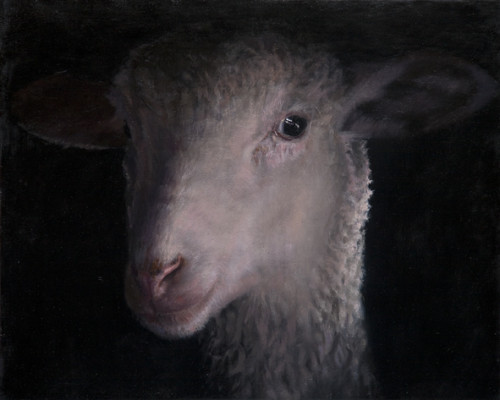
Jorge Diezma
“The central fact for me is, I think, that the intellectual is an individual endowed with a faculty for representing, embodying, articulating a message, a view, an attitude, philosophy or opinion to, as well as for, a public, in public. And this role has an edge to it, and cannot be played without a sense of being someone whose place it is to raise embarrassing questions, to confront orthodoxy and dogma (rather than to produce them), to be someone who cannot easily be co-opted by governments or corporations, and whose raison d’etre is to represent all those people and issues who are routinely forgotten or swept under the rug.”
Edward Said
“He who affirms the Devil creates or makes the Devil.”
Eliphas Levi
Le Ritual le Haute Magie
“The idea that humans “naturally” like “freedom” or “choice,” if that means that they like continually to have to exercise their unbridled judgement or make decisions under the conditions of great uncertainty, is unfounded. This does not mean, of course, that they like to be in painful bondage, and much of human life is an attempt to find a path through the world that is responsive to the two forces of avoidance of novelty and choice and avoidance of the painful consequences of failing to revise one’s beliefs and attitudes when that is necessary.”
Raymond Geuss
Among the topics that seems to continue to be raised — at least with people I know, but my sense is that it’s in the zeitgeist right now across the society, is that of institutional education. I had a disagreement of sorts with a woman this week who I have known for a long time. And it was about MFA theatre programs. It could have as easily been about any MFA humanities or arts program. And the stunning aspect of this dialogue was the identification this woman felt for an institution that I know she hates. I’ve received enough social media messages from her to know she dislikes the racism on campus, dislikes her adjunct status, her job insecurity, and many of her fellow teachers. All of which I sympathize with and suspect are accurate observations. Nonetheless she referred to the MFA theatre program as *our* program. From whence comes such identification? Well, I will get back to that question, but more, the real issue was the entire idea of even having masters degrees in theatre. I don’t fully grasp what that even intends or means. All I can glean is that those with an MFA can probably teach, somewhere, and without that degree they probably can’t. What sort of artist seeks a career teaching playwrighting at University? See, I don’t know but to me it sounds like one of the special inner circles of hell. Twenty years at some small mid western college, or some even smaller private Catholic University in the north east, or some football factory in Alabama or Georgia. I mean there are only so many Ivy league schools, and I’m not sure that is any better anyway. Now I don’t doubt there are quote end quote *good* programs. Its just that I have no idea what that means, and deep down, upon reflection, I’m not at all sure there are good programs…again, assuming that is even possible to define. And the reason it’s all but impossible to define is that regardless of high quality professors, or some semblance of autonomy, the school is defined by its donors and corporate sponsors, and by a system of patronage that extends its tentacles deep into all corners of the society.

Franciscan missal, 14th century.
“Satan [is] the eternal rebel, the first freethinker and the emancipator of worlds. He makes man ashamed of his bestial ignorance and obedience.”
Bakunin
Institutions are guided by inherent laws of finance and exclusion. All institutions. An institution is by definition about laws and rules.
“Institutions are the kinds of structures that matter most in the social realm: they
make up the stuff of social life. The increasing acknowledgement of the role of institutions
in social life involves the recognition that much of human interaction and activity
is structured in terms of overt or implicit rules. Without doing much violence to the relevant
literature, we may define institutions as systems of established and prevalent social
rules that structure social interactions. Language, money, law, systems of weights and
measures, table manners, and firms (and other organizations) are thus all institutions.”
Geoffrey Hodgson
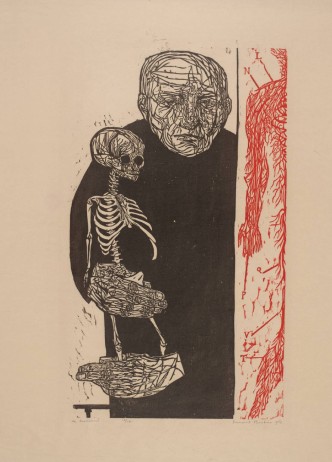
Leonard Baskin (1952).
As Hodgson says later, institutions create stable expectations of behavior. Now, not all social structures are institutional. Not all operate by a tacit implied enforcement of rules. But all institutions do. This all gets very complicated when one gets down to the idea of rules. Putting that aside for a moment, institutions operate by socially transmitted expectations of agreement — normative rules of interpretation. Institutions always present themselves as the product of socially transmitted and codifiable conventions. It is not, however, nearly true all the time.
Nathanial Mills, writing about Althusser:
“It’s a basic Marxist tenet that the state, as a set of repressive apparatuses, functions to protect ruling-class economic interests. Althusser extends this definition by introducing a distinction between “Repressive State Apparatuses” (RSAs) — the penal system, police and military — and “Ideological State Apparatuses” (ISAs), or social, cultural and political networks such as the family, education, religion, arts and culture, systems of political parties, popular media and so on. Both secure ruling-class domination, although only the former does so by explicit force. One of many scandalous insights of the essay is Althusser’s designation of the diverse spheres of modern social life as, like the courts or army, “state apparatuses”: going to school, practicing a religion, having a family, or consuming culture ensure one’s subjugation to capitalism. But how? If RSAs function through force, ISAs compel by ideology.”
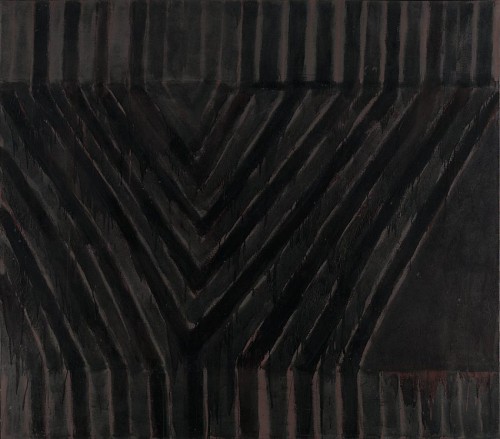
Frank Stella
But back to rules as they exist in the institution. The basic truism is that laws become rules when they become customary. Again, terms such as customary are hugely contested, actually. But for the purposes here, the point is that all institutions operate strictly according to rules, and that society itself operates according to presumed intentions which create expectations of behavior. One has to believe others in one’s group or class or system hold the same understanding about intentionality. This is where the Althusser notion of ideology arises. And Universities are acutely ideological. They cannot help but be so.
Hodgson again….“By structuring, constraining, and enabling individual behaviors, institutions have the power to mold the capacities and behavior of agents in fundamental ways: they have a capacity to change aspirations instead of merely enabling or constraining them.”
And this idea of aspiration is very important if we are discussing the modern University. And certainly fine arts in the modern University. When literature and painting, and even dance began to become more secular, and privatized, the consumption of these art forms, of the artworks, became more private and isolated. I’m not sure exactly to what degree this is fully true, but its at least partly true. And theatre was, up until the 1800s, something that an audience associated with collective viewing and experiencing. So in one way the advancing privatizing of art and culture shifted the focus of aesthetic experience onto an individual that was largely a product of certain social training and conditioning. And here I am reminded of Raymond Geuss’ essay on Thucydides, and his wondering what if Western society had followed along in the train of Thucydidean shame and tragedy (and inquiry) instead of Plato’s anality, and the later Christian guilt.
“Thucydides is specifically interested not in the past but in understanding those forms of collective human behavior that are recurrent
and thus comprehensible. He pursues this aim by giving a narrative account of what was for him the present: current affairs, in some of which he was himself an actor. Part of this narrative account is an analysis of the motives and reasons of various individual and social agents. One could then say that heis trying to do something like what we might call “social and political theory” or even “behavioral science” (if the later term could be cleansed of all the associations it has acquired during the past century or so), but only provided one keeps clearly in mind that he does not think there are “laws” of history or society which we can formulate abstractly and the mastery of which will allow us to control our fate. One of the most important things one can learn from the study of “human nature” is that this kind of control is an illusion.”
Raymond Geuss
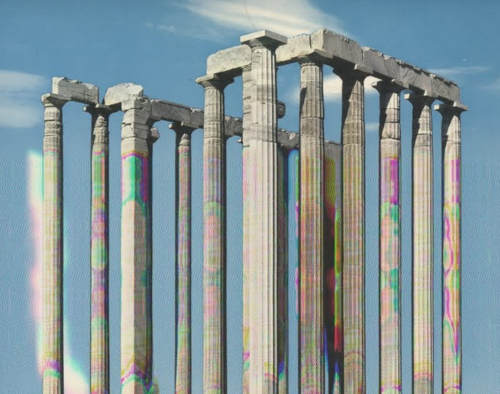
Assaf Shaham, photography, mixed media.
Under Capitalism the institution is a repository of ideological coercion. All institutions but perhaps none quite as acute as that of the University (or any school).
Here is Mills from that essay on Althusser…
“Under capitalism, the education system is the primary ISA, where students learn the knowledges that distinguish workers from exploiters, as well as to internalize “the freedom, morality and responsibility of adults” — standards of conduct that normalize bourgeois mystifications of capitalist productive relations. Althusser the Marxist professor recognizes that, rather than an ivory tower, the academy is actually essential to capitalism’s functioning and endurance.”
And allow me here one more quote from Geuss, on Adorno and Art…
“…one couldn’t evaluate a work of art as art by such criteria as
whether it gives a good imitation of reality, whether it has contributed to social
progress, or by moral criteria. Usually this claim that art is autonomous
was taken to mean that art produces distinctive “forms” that are inherently
significant and worthwhile, and that the experience of these “forms” is in all
relevant respects self-contained. Obviously art arises only in a certain social
context, but any attempt to relate art to anything outside the aesthetic experience
itself—the experience of a certain response to formal properties exhibited
by the work—and thus in particular any attempt to relate art to society
or history is at best a case of missing the point or changing the subject (for
instance, from experiencing a painting to doing art history), and at worst a serious
confusion. The claim that art is autonomous in that it is governed by
rules and laws which it gives itself is taken to imply a formalist normative aesthetics,
that “good” art is good by virtue of its satisfying form.”
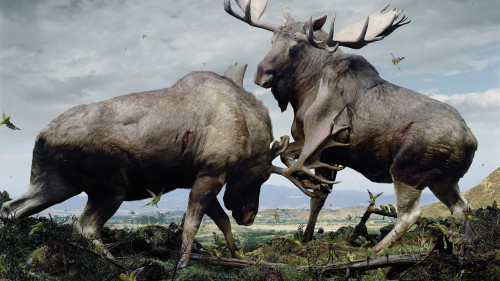
Simen Johan, photography (Natural History Museum, U.S.).
Now, this is very germane to a discussion of art and the University, even if it is also sort of obvious. But it also segues into the Althusserian notion of ideology and the state. For Adorno, the plague of the Enlightenment came from exactly the institutionalization of a certain narrow kind of rationality. A rationality which was both directed at control of what was defined or described, and to enforce a consensus on these definitions and descriptions. In other words everything would ‘be’ for something else, in the same way experience must be that which can be catalogued into a rational system of some sort. Its an absolutizing syndrome of coercive thought. And in terms of art, only the artwork that self creates its own terms of expression will have any value because only then can it resist the totalizing conformity of thought that is advanced capitalism, which in turn is interconnected with this historic process of co-opting genuine Enlightenment values. Now, I go over this again, here, because its useful to see it in terms of contemporary Institutional education (especially in fine arts). The short form version is, finally, one cannot write great plays in MFA programs. The forces of homogeneity and tacit rote obedience are simply too strong. And even if, as a thought experiment, a great work was produced (whatever that might mean) the structure of consuming that work would also be within a structure of nullification.
This is true of course for most institutional and non profit theatre (the same thing). I remember my first equity production, and the sense I had of my connection to the play gradually and inevitably slipping away. The play became the play of the institutional theatre producing it and there was nothing I could do to stop that. Now most artists I know intuitively understand this. They need to create a space to create as much as the creating itself. And that means a kind of outsider perspective, a certain awareness of what, psychically, feels like autonomy. And this is always anti institutional.
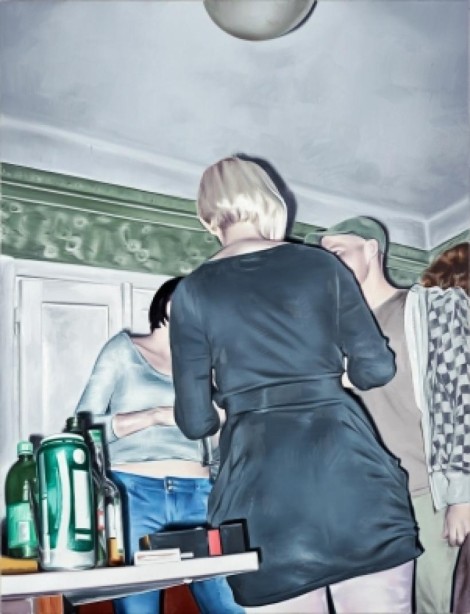
Marcin Maciejowski
Geuss, from his essay on Adorno and art…
“the Schönbergian crisis in the early part of the twentieth century in which the split between the increasingly horrible world-as-it-is of incipient monopoly capitalism, on the one hand, and the residual images of the good (of human happiness and freedom) which society continues to project as part of its attempt at self-legitimation, on the other, has become infinite and seems utterly unbridgeable. The sense of desolation in works like Erwartung is an expression of the infinite unattainability of any real freedom and happiness in our world. To experience our state as one of desolation, however, implies that we still have some grasp of what a qualitatively better world would be like, even if the image we have of it is only negative: that it is not like this world in some essential respects.”
The contemporary system of advanced Capital is one in which the absorption of all resistance is nearly complete. And while that is an entire topic onto itself, the relevant aspect of this (for this posting) has to do with the ways in which the erasing of the individual, which was always an illusion anyway, has now rendered the critical capacity of a majority of the population incapable of even rudimentary discriminatory judgments. Hence work that is popular almost without exception tends toward the most infantile and empty narcissism. And because it provides little experience of an aesthetic sort, the need is to quickly produce more, new versions of the same.
The sense of a collective nihilistic morbidity is everywhere. A recent article in The Guardian, on ‘facadism’ in architecture, reveals in stark clarity a kind of ‘death wish’.
http://www.theguardian.com/artanddesign/architecture-design-blog/2014/aug/25/front-facade-bad-developments-ruining-historic-buildings
These architectural monstrosities are an expression of the brute primal narcissism of the aberrant child. And it is just this institutional project that defines itself through its dystopian collective unconscious. The killing off of spontaneity by a coercive set of rules and conventions means that audiences no longer really care very deeply about the artwork. They care far more about the institutional structure of its presentation, or in essence its commercial viability. Popularity is directed by the system itself and is its own justification.
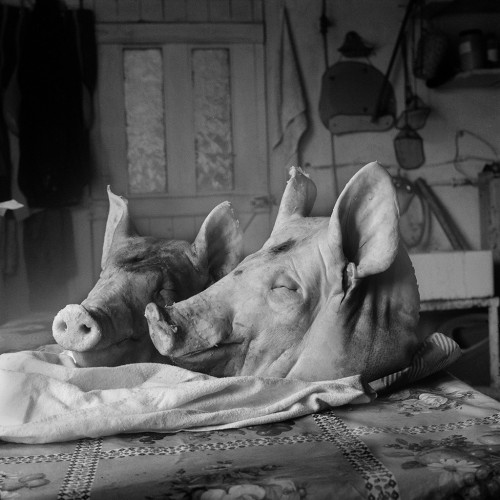
Daneil Michiels, photography (Belgium).
The rise of a new fascism (which can be seen in the Trump phenomenon) must negotiate a certain contradiction with institutional conventions and codes. The submission to the authoritarian figure is erotic at its core, and it is, as Adorno pointed out in his essay Freudian Theory and the Pattern of Fascist Propaganda, and must be based not on perception but on an erotic tie — that an overflow of narcissistic libido is targeting this idealized authority figure, one who has in a sense replaced the Father. The failure to meet his own ego demands results in narcissistic impulses that are transferred to the new Authority figure. “In order to allow narcissistic identification the leader must appear as absolutely narcissistic.” (Adorno). The fascist leader must not give — but oscillate between threat and denial. He can be loved by the masses only if he himself does not love. Now this is all interesting in light of the current electoral circus. And in light of the relationship of the public to institutional conditioning. Today, with mass electronic media as the delivery mechanism the follower must both idealize the leader and see himself in the leader. As Adorno said, Hitler was both King Kong and a suburban barber. Trump is both playboy billionaire jet setter and one of the guys, given to petulance and petty bullying. The contradictions are numerous of course for the rigid institutional obedience of the general population is given scope for agreement in the leveling aspect of the in-group. Trump’s followers see each other as equals, all in the same boat. As as with Germany in the 1930s, the pleasure seeker or dissident or artist is a special target (along with the poor and minorities). The fascist orator always uses words devoid of meaning for it is strictly the oral fixative character of their speech that matters. One of the most interesting aspects of Adorno’s observations here is the appeal of phoniness — that the obviously phony quality of the slogans fits seemlessly with a cynical sadism. Again, as Martha Rosler noted, people choose the fake. This has been ratcheted up several notches in contemporary screen addicated society. Trump being a TV star is a perfect fit and one foreshadowed by Reagan the crappy B-movie actor. The fake or phony only reinforces the virtue of sheer power. No justification is needed. Once again, popularity is its own justification — and the new fascist is anti institutional by being ‘more’ institutional at his or her core. Trump is the master of institutional gaming. He is the one who triumphed over the system. Beat it as its own game (never mind he inherited his money). The identification of those whom the system has beaten down is all too easy to understand. Power is a virtue, and the followers of the fascist orator do not want programs or reflection or analysis. They *need* constant repetition of the same empty rhetoric. As long as that rhetoric is in the mouth of the leader.
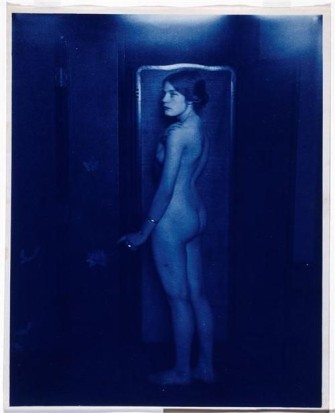
Paul Burty Haviland, photography. (apprx. 1920).
So, returning here to culture today, to the role of institutional controls, the only outlet for escape is provided by the anti cultural leader. Fascism is erotically bonded and its irrationality made into a virtue and kind of proof of the latent cynicism and defeatism of the masses. In art, the autonomous artwork will be singled out for particular abuse (often from the left as well) for it disrupts the perpetuation of dependence. And everyone is dependent today. So, this digression is only to provide a better context for understanding the inherently reactionary and regressive quality of institutional aesthetic production. Piya Chatterjee has written extensively on what she calls the Imperial University. And one key point was the way in which faculty had internalized a certain ‘mode-of-being’, a style of modulated presentation, contained, civil and which reacts with negative restrictions to any form of organizing. She wrote in an interview….“Furthermore, in trying to counter censorship of events related to Middle East politics, it is very evident that well-funded, off-campus lobby groups exert a great deal of pressure on administrators to suppress political views they do not like. But administrators too are increasingly part of the well-funded neoliberal academic complex that is in line with the security-surveillance state.”And this is really a good part of the problem, or rather a good part of ONE problem associated with Institutional learning. Like gallery owners, artistic directors of non profit theatre, curators and administrators at grants organizations, these clerks of Empire have a vested interest in conformity. And their thinking is very much in line with a template for the personality that I see having formed just in the last thirty years. The affluent ownership class, white, educated, and often in positions of decision making for institutions are increasingly uniform in their presentation of self (to use Goffman’s famous term). They are moderate, their speech is modulated and tending toward affectless monotone, and this is in line with their ideological project of erasing radical voices. Their own speech (again this oral fixation) reflects their beliefs — obedient, acquiescent to authority, bland, colorless and polite. But this is a very specific kind of polite. It is Sunday school polite, but always firm. The firmness is the residual Puritanism that is just beneath the surface. (as a side bar note here, those same Sunday school manners are the ones employed by military officers).
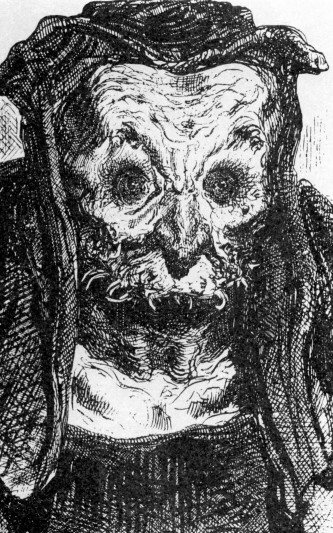
Gustav Dore (The Wild Man).
Now, one can argue that this or that MFA program in the arts is different, that this or that professor grants total freedom to students, and they can paint or write or perform whatever they want. And this may, on the face of it, be completely true. But the secondary meanings that lurk in the very physical plant that is the University (fluorescent lighting, municipal shades of green or blue, and the linoleum flooring — and see, even if this is a very rich private school, the marble floors still are linoleum) are part of a fabric of aesthetic battering. The institution operates by enforcing anticipated behavior, and school loans and grades and all the other endless bureaucratic tasks for students and adjuncts is never absent from daily life. And the language of dramaturgs (to return specifically to theatre) is the language of the kind but no nonsense kindergarten teacher.
Eleanor Badar (at Truthout) wrote of the Salaita case….“Ah, yes, academic freedom. Salaita unmasks the so-called civility and collegiality standards that are supposed to protect academic discourse, allowing people to agree to disagree without rancor, and calls them what they are – forms of control. “Critical thinking is fundamentally incompatible with conformity, which is collegiality’s primary desire … Collegiality is the etiquette of submission,” he writes. “It is impossible to be collegial when challenging the common sense of corporate domination, no matter how politely you state the criticism.”
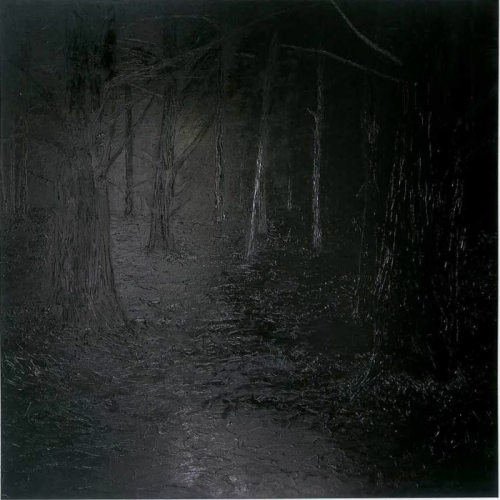
Gillian Carnegie
My argument this week centered around a student who had won a developmental workshop of her play. She probably got some tuppence thrown in and a trip to Colorado or LA or wherever. The point is what is all this about? And the first answer is, it is about developing an economically successful play. That is also the second answer, and the third.
Developing a culture of awareness and radical vision is not on the menu. I know personally some very smart and talented playwrights who teach at University. And I respect them. But I doubt they are producing radical work. And people are kidding themselves if think this is so. Still, the indoctrinated will argue that students are writing *political* plays and have complete freedom. What this means for the educated class are plays of identity politics; i.e. plays about one or another marginalized minority. There are no plays though that break through the barriers of the administered gestalt of ideological domination. But there is another issue connected to this; and that is the nature of theatre itself here in 2016. One of the glaringly obvious truths of theatre today is that it cannot compete in terms of numbers (or economically) with screen medium arts. Films and TV are the nearly hegemonic avenue for narrative expression. And of course that means, with corporate ownership of the production and distribution of these screen products, the effect is to further make invisible the outsider. There is no audience for outsider work because we are into the third generation of a screen raised population. Horkheimer and Adorno said, in the forties, “culture has evolved under the shadow of the executioner”. Adorno, in his essay on Freud and fascism, noted that Freud, with prophetic insight, predicted the post psychological man. A post individual atomized fascist collective was already on the horizon in the 1920s. And of course it soon arrived. Today, the average TV drama is infantile, often based on comic books or children’s books, and excessively violent, though often it is a choreographed stylized violence, but still graphic at times, and centered on very simple almost rudimentary stories — stories which the audience, even as limited as they are — recognize as simple. But they want simple and they want fake. For the new openly racist fascist followers of Trump for example (as was true to some degree with Hitler) the group knows deep down that Trump is a phony. But that is fine, in fact it’s exactly what they want. As Adorno said, again; “it is through this performance that they strike a balance between their continuously mobilized instinctual urges and the historical stage of enlightenment they have reached; and which cannot be revoked arbitrarily.” In other words if they had time and inclination to think too hard about the spectacle before them, it might all crash to the floor in a heap. Freud took note of this same quality with hypnosis, which at the very bottom of the event, is only a game. But the game became socialized, and Freud noted the difference…hypnosis was between two people only.
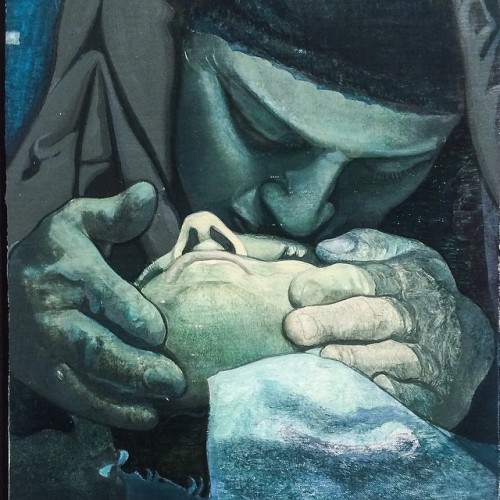
Victor Man
‘Make America Great, Again’
‘Germany Awake’
This is an identical hypnotic spell. And it is, of course deeply regressive. And today, even the lumpen white patriarchs that follow Trump (I had a white man tell me this week, ‘Trump is the most successful person of his generation’) are conditioned by the coercive structures of institutional living. From traffic tickets to rent and work evaluations and credit loans, etc — the mass white man cares little the motives of the hypnotist. As long as the performance can take place. I suspect there was actually more potential for disenchantment with the Furor, in 1932 than with Trump today. For the contemporary ego has lost touch with the final few threads of pre historical instinct for survival. The institution today is never going to produce plays in a radical language of refusal or resistance. And while Im happy this young student gets her tiny paycheck and trip, the question remains as to what the point is of all this?
Marcuse suggested (as have others) that Freud’s individual psychology is really social psychology. Our psychic make up is historical and collective, and while the post Freudian revisionist psychologists see symptoms of self sabotage where, perhaps, Freud saw the death instinct or Thanatos, I would be hard pressed not to see at least Western society as now unremittingly death driven. It was Auden who wrote that to be free often means to be lonely. But really, I no longer think I know what freedom means, although I do have a pretty good idea of what NOT free means. The fact remains that taking up the profession of playwriting means you are going to have to get an MFA. And to get that you will have to submit to however many years of docile intellectual janitor work. But this is the nature of all institutions. I continue to think of the witch trials throughout Europe in the middle ages. The Devil was often called *the Master of Serfs*. Ruling class fears of the masses continues today, and embedded in institutional form across contemporary society. There are countless drawings and etchings, circa the 16th century, from compendiums of black magic that show followers of the dark arts kneeling to smell the farts of a beast with a goat’s head, or sheep’s, and the body of an ass or horse or even rabbit. Humiliation is embedded in the institution as well, you see. Control the unruly masses. Make them submit. So, with a resurgent fascism around the globe, the sole Imperialist power is acting out a carnival of dark arts itself. Trump and Hillary are the flip side of the same mask. The leering goat face of Mrs Clinton and the unnatural orange hair of the side show barker that is Trump, baring his rodential teeth — doing battle in a metaphorical arena for the amusement of the white patriarchal ruling elite. Meanwhile the war machine marches on.
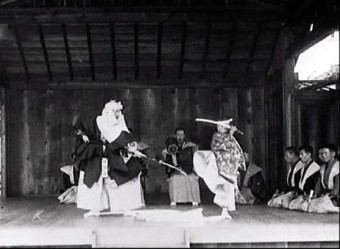
Still from 1912 film of Noh performance, Bukkoji temple, Kyoto.
“By the 18th century progressive social changes were taking place across Europe and the witch-craze that afflicted France, and much of the continent, had more or less died down. The mass witch hunts ended with the edict of Louis XIV in 1682, and the last French execution for heresy was in 1745. The forces of Church and State had also largely reigned in (“Christianized”) the remote and rebellious rural areas, extinguishing the spirit of defiant social autonomy carried over from the Middle Ages and earlier times. Devil worship and black magic practices ceased to be rooted in the pagan folk traditions, heretical teachings and popular superstitions of the countryside and instead became the dark plaything of urban bourgeois circles.”
Mark Lasky
The administered society, one governed by rules and institutions, could be seen, in one sense, as an expression of Freud’s death instinct.
“We cannot escape the suspicion that we have come upon the track of a universal attribute of the instincts…It seems, then, that an instinct is an urge inherent in organic life to restore an earlier state of things which the living entity has been obliged to abandon under the pressure of external disturbing forces…the expression of the inertia inherent in organic life.”
Freud
Beyond the Pleasure Principle
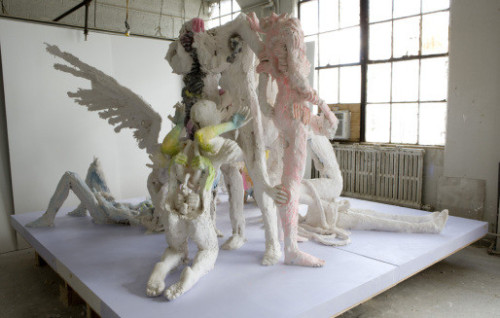
David Altmejd
The later stages of industrial society, and the transition to post industrial elicited a huge amount of artistic creation that addressed the soul deadening conditions of exploitive labor. From Kafka came an image of a cockroach as the final stage of life led according to institutional rules. Repetition is the pure expression of a death drive that looks backward to the relief of originary stasis. If guilt is both a fear of authority and fear of internalized authority (the super ego) the civilizing process for human maturation was one in which the super ego indirectly produced guilt and remorse, but the point is that sadism and sexuality (pleasure) are interconnected. And renunciation is an inheritance shaped over time from an archaic past. Regardless of its unpopularity Freud’s death instinct touches on all the qualities one sees in contemporary society. And in fact the hyper repetitive nature of mass culture today feels increasingly like a reptilian reminder of pre-history; or as Marcuse saw it, mass psychology and aggression (fascism) was the result of humanity’s paralysis at this early stage of repression. A consideration of masochism is necessary here for masochism is directly linked to institutional humiliation. The smelling of the Goat beast’s farts is the price of success in an irrational society of alienation. All sick children will later exhibit symptoms of masochism. The adjustment to pain in early childhood is erotic, and later masochistic (this is just my personal belief). I have said all stories are crime stories and all stories are about exile and homesickness. And both exile and homesickness are narrative versions of (as someone said) the salmon returning to the spawning ground. For that is a core repetition. And repetition is death.
Class oppression, war, genocide, slavery and gender violence all speak to Freud’s having rather soberly noted something problematic in being human. This does not mitigate at all the desire for relief from oppression, but in the shadow of escalating irrational violence and environmental crisis, and the continuing Imperialist project of the U.S. super power, it is worth examining some of the more obvious delusions of the Western bourgeoisie.

Ben Alper, photography.
The questions of culture, and specifically here, for theatre, are crucial, I think, if art is to have any meaning at all anymore. And it may well be that theatre as it has existed since Shakespeare, is simply now impossible. I suspect this might be true. But that only means another form of collective cooperative ritual will replace it. And if people want to call this theatre, too, that’s fine with me. But theatre has always been about the creation of a stage; a playing area that starts as the scene of the crime. And ends with the salmon returning to their spawning ground. The narcissism of petty complaints about identity that saturate today’s theatre landscape only serve as exclamation point to this. The playing area is empty. Brook’s title still resonates. The Empty Space. And once you have created that empty space, another unseen space, unsee-able space, forms just out of view. And it is this dynamic that makes a play. And the truth of theatre is that it cannot abide reptition. For repetition is diverted to rehearsal. And there the oral fixative repetitions of sado/masochism are run into the ground. Once neutralized and incorporated, the repetitive oration becomes a performance. And the hell of other people are there to watch it. For they must return, too. Guilt, shame, and fear — and purposelessness. That is theatre. It is probably not a coincidence that economic factors now preclude adequate rehearsal time. For only the protracted misery of rehearsal can rid the actor of his untruth. Once that is achieved, he can step into the light, in that empty space, and speak. And more, to narrate. He or she cannot NOT narrate for that is also a quality of the stage. In that space, all speech is a story. It matters not at all if the audience has heard the story before. In fact it might well be preferable if they know it. The mimetic karaoke that ensues in the audience member is a enactment, silently, of our psychic disfigurement. And at the end of the story, no matter the ending, at THEE end, there is the completion of the sacrifice (Girardian).
William Butler Yeats, on Noh theatre…..”
“These Japanese poets, too, feel for tomb and wood the emotion,
the sense of awe that our Gaelic speaking country people will
sometimes show when you speak to them of…some Holy Well:
and that is why perhaps it pleases them to begin so many plays by a
Traveller asking his way…a convention agreeable to me.”
Zeami..on Noh theatre:
“The following might be said concerning making judgments: forget the specifics of a performance and examine the whole. Then forget the performance and examine the actor. Then forget the actor and examine his inner spirit. Then, forget that spirit, and you will grasp the nature of the noh.”

I know a little about this subject I think. There are perhaps (and I emphasize that word) colleges (and have been in the past) that are not part of the paradigm you describe. The current example I would give is Evergreen State in Olympia, Washington. I’ve been there and it does not feel like the usual state run institution with its mandated “requirements” and “grades”. I also think such places are very rare and probably will disappear. More importantly there once existed a place you know all about, John, Black Mountain College which was rare and nurtured great artists. So it is possible but not likely, particularly now. And this is tragic for everyone. Any state run institution today including my own, a small community college in No Cal in a depressed working class area has altered radically even in the last 30 years. I was lucky. I got a job there when no one cared about the school and it was basically a last chance. And I say lucky because we were not being watched, evaluated, judged and I was free to explore so many areas never afforded me before and to bring students along for the ride. Recently it was voted one of the top 100 community colleges in the nation which tells me it is time for me to go. The atmosphere has changed and while it looks and sounds more legitimate to folks on the outside and there are many fine and compassionate and highly committed people there and outstanding programs in music etc…the sense of those areas under threat is very real. And it comes from the state’s grip which comes from the corporate rule. Sad times in America.
I know very few playwrights getting MFA’s so they can teach. Mostly, it’s about networking. There are play development opportunities that explicitly require playwrights to have an MFA to apply. Check this out:
http://www.americantheatre.org/2016/02/16/giving-emerging-playwrights-a-boost-with-the-kendeda-competition/
Of course, I’m pretty sure with many opportunities it’s more implicit and the appearance of openness is just that–an appearance. I only apply when I’m fairly certain my play will at least be read (even if it’s only 20 pages).
On a more hopeful note: there’s a group relaunching the Black Mountain School. http://www.blackmountainschool.com/index.html
I love Zeami…
I would never get an MFA in playwrighting. It would be pointless for me and the cost is obscene. I’d rather study aesthetics and criticism, but even that is impossible with the cost of US programs. It actually makes more sense to move to Europe and study there. Even considering that I’d have to move my entire family. We might be better off.
I’ve also been thinking of creating a DIY MFA based on this program: http://www.c-cyte.com/OccuLibrary/art_as_social_wormhole
@elizabeth: I guess I should have said networking AND teaching. Because, remember also that how many MFAs are given out each year and how many non profit theatres produce new plays? And even if the numbers were to match up (which they don’t) ..there is still no money too made– a quick glance suggests, per 2010, that 317 world premieres for the US. I suspect there are far more MFA programs. Of course there is a hierarchy in terms of who gets work. Go to brown or columbia or yale and you get work. Go to south dakota state, not so much. But my point is that most MFAs end up teaching somewhere.
@joanna…..im sure there are colleges that are exceptions to prove the rule. But even there, regardless of the atmosphere, the institutional structure cannot be avoided. I think its impossible. You tacitly accept the system when you sign up.
And yes, its gotten much much worse. Thirty years ago the situation was far different. FAR different. It is insidious today, and pernicious. And when i read over the faculty lists for most universities, I get very depressed. You cannot do this as a career first enterprise. Beau Willimon teaches at Columbia, and he is the exec producer for House of Cards…..frank pugliese teaches there and is show runner for same….and on and on and on it goes. Its a closed shop. And all to get to participate in these reactionary crypto fascist TV or film projects.
I agree John..most MFA’s end up teaching in a closed system where the game is rigged. And I also agree it is a done deal re: showrunners and exec producers. No doubt whatsoever. What is hopeful is that now anyone can make a film or series on their I Phone or smart device and edit it at home, distribute it themselves online etc. I think Louis CK is doing some amazing work on his new series Horace and Pete for example. I think we will see more of this and an energy that begins to develop international work with international influences. I am hopeful.
This topic is especially important these days as education has been gutted in terms of its use to serious art and any human way of working is incompatible with the winner take all marketplace that it exists in after schooling ends. When you add high costs with ruthless competition between contemporaries, any chance for some new way of working or collective pursuit is impossible. I got an MFA in fine art from a large city school 11 years ago and was lucky to have a couple good but limited teachers. There were also a couple students, who I am still friends with that were not desperate to find a gallery and be professional by any means nessesary. The class a year later was not so inclined and I expect most programs share these dominat cut throat cultural values. These values disqualify almost all fine art from cultural relevancy by definition, the work serves primarily as alternate currency and/or interior decoration for the winners. None of this is news I expect to you or the readers of this blog, but thought I would share nonetheless. If nothing else it’s a model of what not to do as a teacher or organization.